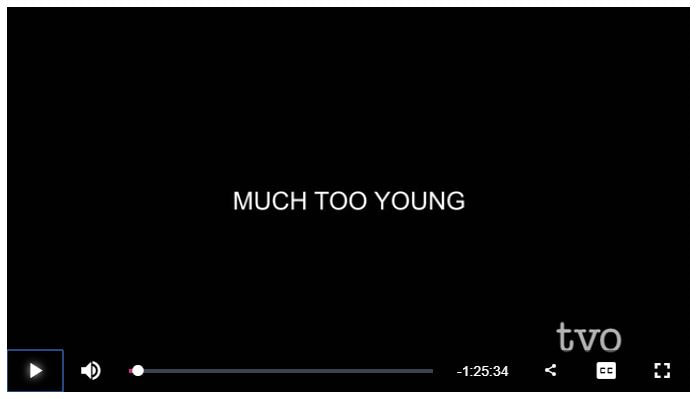James: Masters degree, young adult carer, and hilarious guy!

My friend James had a goal of getting his MA in economics. He knew it would be a big challenge as he didn't have the prerequisite courses, and it would mean going back to school and taking on more debt after a year of being free from debt from his undergraduate studies.
To make things more complicated, his mom's Alzheimers became more severe, and so leaving for school meant added pressure on his family. James spent every Sunday during his MA with his mom, when his dad would drop her off to visit. In his words: “It was a lot of work, a lot of balancing, some definite struggles - and I almost failed the course.” But great news in the end – he persisted, ultimately getting his MA as well as a fantastic job at the Bank of Canada, which is something he never thought he could do.
I’m so proud of James and all he has achieved (he’s also one of the FUNNIEST guys I know – he always puts a smile on my face), and I can’t wait to see what he gets up to in the future!
We chatted about going back to school when he'd just gotten out of debt, the importance of support in a tough situation, and why we sometimes need those sh*tty situations to show how far we've come...
Let's get started!
What made you decide to get your MA... was it was something you had wanted to do for a while?
I studied philosophy for my undergrad, and always knew I might need to study something else afterwards to get a job I really wanted - but I wasn’t sure what or when that would be. I took economics for the first time in undergrad and really enjoyed it, so the idea floated around in my head of going to grad school for economics.
Fast forward to my first job after university, and I hated it. I was miserable going to work, and didn’t feel like I was being challenged... I felt like a baby could do the work! I was literally copying and pasting information from one database to another. So it seemed like a great opportunity to quit and go back to school...
What challenges did you face at the start?
1. Money...
While my job had enabled me to pay back my student debt, I didn’t have any extra money saved up, so going back to school would mean going back into debt. I’d also be living away from home, so would have those extras expenses.
2. Pre-requisites...
I also didn’t have the required courses for the programs I wanted to apply for. Luckily, my undergrad school offered a special one-year “catch-up” program, where you can take the undergraduate courses you need and then apply for your masters and they give you preference, as it were. So that was my goal: do well in the one year catch-up course, and through that, get into the grad program.
3. Family situation...
I had to check with my family that they were OK with me going back to uni for two years. My family and I all pitch in with my mom: my dad’s her full-time caregiver, and my brother, sister and I rotate where we go a few nights a week to help out. The school was only about an hour and a half away, so not too far, but I wouldn’t be at home during the week, so we needed to have a discussion around that.
My dad plays in a band near my school, so we decided that on Sundays he would drive my mom over and I would spend the day with her. So I still got to spend time with my mom, help out a bit, and relieve some of the pressure on my brother and sister.
To make things more complicated, his mom's Alzheimers became more severe, and so leaving for school meant added pressure on his family. James spent every Sunday during his MA with his mom, when his dad would drop her off to visit. In his words: “It was a lot of work, a lot of balancing, some definite struggles - and I almost failed the course.” But great news in the end – he persisted, ultimately getting his MA as well as a fantastic job at the Bank of Canada, which is something he never thought he could do.
I’m so proud of James and all he has achieved (he’s also one of the FUNNIEST guys I know – he always puts a smile on my face), and I can’t wait to see what he gets up to in the future!
We chatted about going back to school when he'd just gotten out of debt, the importance of support in a tough situation, and why we sometimes need those sh*tty situations to show how far we've come...
Let's get started!
What made you decide to get your MA... was it was something you had wanted to do for a while?
I studied philosophy for my undergrad, and always knew I might need to study something else afterwards to get a job I really wanted - but I wasn’t sure what or when that would be. I took economics for the first time in undergrad and really enjoyed it, so the idea floated around in my head of going to grad school for economics.
Fast forward to my first job after university, and I hated it. I was miserable going to work, and didn’t feel like I was being challenged... I felt like a baby could do the work! I was literally copying and pasting information from one database to another. So it seemed like a great opportunity to quit and go back to school...
What challenges did you face at the start?
1. Money...
While my job had enabled me to pay back my student debt, I didn’t have any extra money saved up, so going back to school would mean going back into debt. I’d also be living away from home, so would have those extras expenses.
2. Pre-requisites...
I also didn’t have the required courses for the programs I wanted to apply for. Luckily, my undergrad school offered a special one-year “catch-up” program, where you can take the undergraduate courses you need and then apply for your masters and they give you preference, as it were. So that was my goal: do well in the one year catch-up course, and through that, get into the grad program.
3. Family situation...
I had to check with my family that they were OK with me going back to uni for two years. My family and I all pitch in with my mom: my dad’s her full-time caregiver, and my brother, sister and I rotate where we go a few nights a week to help out. The school was only about an hour and a half away, so not too far, but I wouldn’t be at home during the week, so we needed to have a discussion around that.
My dad plays in a band near my school, so we decided that on Sundays he would drive my mom over and I would spend the day with her. So I still got to spend time with my mom, help out a bit, and relieve some of the pressure on my brother and sister.

Was it a tough decision, as it affected your family as well?
It certainly made it more difficult. I imagine for a lot of young people, if they want to go to grad school they have two things to consider: do I want to do it; and can I afford it. I had those thoughts, but I had other factors to consider well.
I knew that it would have an impact on the rest of my family. It worked out in the end but it was worrisome, and I was concerned about away from my mom for that long.
Do you have any advice for other people facing a challenge like this?
When I decided to go back to school, I was really determined to do it - that’s what guided me. I can’t easily give advice on getting that determination, because you either are determined to do something or you’re not… it’s hard to force yourself! But if you are, there are always ways you can manage; it just requires approaching the situation like an adult. So with my situation, I knew there would be extra challenges, and we had to have some big discussions.
I also had to rely on other people. If you have a network of people you can rely on, I think you can accomplish whatever you want to do.
(Claire’s note – I totally agree!)
It certainly made it more difficult. I imagine for a lot of young people, if they want to go to grad school they have two things to consider: do I want to do it; and can I afford it. I had those thoughts, but I had other factors to consider well.
I knew that it would have an impact on the rest of my family. It worked out in the end but it was worrisome, and I was concerned about away from my mom for that long.
Do you have any advice for other people facing a challenge like this?
When I decided to go back to school, I was really determined to do it - that’s what guided me. I can’t easily give advice on getting that determination, because you either are determined to do something or you’re not… it’s hard to force yourself! But if you are, there are always ways you can manage; it just requires approaching the situation like an adult. So with my situation, I knew there would be extra challenges, and we had to have some big discussions.
I also had to rely on other people. If you have a network of people you can rely on, I think you can accomplish whatever you want to do.
(Claire’s note – I totally agree!)

Were there times you wanted to quit?
Basically, yes! The first trimester of my second year was really difficult and I ended up failing two finals… (one of them half the class failed, so I didn’t feel too bad!) The classes were difficult, I didn’t enjoy them, and I didn’t do well, so it was quite a rough time. I came home at Christmas and was wondering if I should quit. At this point I was more in debt as well.
But my best friend said to me: "You can’t quit now, you’ve already put in so much!" He got me through it. He helped me figure out exactly what I needed to get better at with the exams, and to find people who could help me or tutor me. He had me think about it in a more critical way: This is what I did well; and this is what I didn’t do well; and this is who could help… I also became more disciplined with my time, and spent more time studying than before.
I ended up passing both my exams… but it was hard! So there were definitely times I wanted to quit, but having people who supported me is basically what got me through it.
What learning did you take from this?
I felt kind of embarrassed about failing the exams… I didn’t want to ask my classmates for help - but thinking about it now, that was ridiculous, because we all have different strengths and weaknesses! But I knew my friend was right and I just needed to suck it up and find people to help me. And people wanted to help, you know?
Basically, yes! The first trimester of my second year was really difficult and I ended up failing two finals… (one of them half the class failed, so I didn’t feel too bad!) The classes were difficult, I didn’t enjoy them, and I didn’t do well, so it was quite a rough time. I came home at Christmas and was wondering if I should quit. At this point I was more in debt as well.
But my best friend said to me: "You can’t quit now, you’ve already put in so much!" He got me through it. He helped me figure out exactly what I needed to get better at with the exams, and to find people who could help me or tutor me. He had me think about it in a more critical way: This is what I did well; and this is what I didn’t do well; and this is who could help… I also became more disciplined with my time, and spent more time studying than before.
I ended up passing both my exams… but it was hard! So there were definitely times I wanted to quit, but having people who supported me is basically what got me through it.
What learning did you take from this?
I felt kind of embarrassed about failing the exams… I didn’t want to ask my classmates for help - but thinking about it now, that was ridiculous, because we all have different strengths and weaknesses! But I knew my friend was right and I just needed to suck it up and find people to help me. And people wanted to help, you know?
What was the most important lesson you learnt?
It made me realize how important it is to stick with something, even when things seem sh*tty and it’s really hard. My course ended up being great: career-wise it was a great move, and I’m really glad I didn’t leave when it got sh*tty.
Having support is really important when you’re going through something like this. It doesn’t help to keep your frustration or disappointment to yourself. I think if I hadn’t have told my friend how difficult it was, I might have quit.
Other people often offer advice you might not have thought of, or might have excluded as a possibility. In reality, people aren’t always good at figuring out what’s best for themselves on their own!
In terms of being more disciplined in terms of your work, how did you do that?
It was really my attitude that changed. The first year wasn’t too difficult, so I thought “I made, it, I just need to play along and do the work”. And then it got more challenging, but by the time I realized how intense it was, it was too late - it was happening and I was freaking out.
I had to study for my two finals as well as start my next few courses, so I realized I had to approach it in a very disciplined way: setting aside dedicated time for studying outside of my normal schooling. I had to sacrifice some of my freedom. I was still seeing my mom on Sundays as well and caring for her, so I was balancing a lot.
I would ask myself: If I only have X number of hours this week to study for this test, what’s the best use of my time? Is it spending an hour with somebody going over any questions I have, or is it wasting three hours of my time trying to figure out on my own what I need help with? So I started working smarter and harder :)

Are you glad you did it?
Yes… I’m very glad. I learned a lot and it helped me get a job in the field that I wanted to go into. Because of the struggle I went through, it made it way more valuable to me. This was a big thing for me and I’m really happy about the learning I had.
Another really big learning for me was that I felt, much more than my undergrad, that I had really accomplished something. It was a real test for me. And finishing it was such a good feeling, and I’m really proud. Like: I did it, even though it wasn’t easy.
Has the experience helped you for your future?
Absolutely, without question. Even now, when I think about things happening at work, or projects that I’m not familiar with, I use the confidence I have from finishing grad school. It’s helped me approach other problems in a similar mindset. I also learned time management - I’m starting a part-time program now, and managing all these things (work, the program, and contributing at home) is in part due to the skills I developed in grad school.
This was a real wake up call for me: "If I seriously want this, I really have to work..."
What did you learn about yourself during the process?
At grad school, no one tells you what to do – you have to figure it out on your own. Going through the experience, as much as it was challenging, made me realize that if you want something you have to work for it… and if you don’t like something then tell it to f*ck off! It turned me into a real adult! And now I feel more comfortable regarding my future... I know I have the ability to set whatever goal I want for myself and just go for it.
What are your plans next?
I realized a few months ago that I had outgrown my current job. I didn’t want to move to Ottawa (the only real option for me for career progression), so I knew I might have to start looking for new jobs.
Recently I found a part-time certificate at Ryerson University in Toronto, in exactly the field I want to move into, and everything about it fit: it’s what I want to do, it’s affordable, I can do it in the evenings, my work covered some of the cost – it was just perfect. So I've decided to go for it.
I’ll also be searching for jobs as well; I talked to my boss and she agrees that I’ve pretty much done everything I can do in this job, and is actively supporting me. It would have been tempting to get discouraged and slack off in my job, but I realized that when it comes down to it, this is my responsibility and my career.
So, so true!
Final note:
James and his family were recently featured on the TVO show Much Too Young - a powerful look at what it means to be a young adult who becomes a caregiver for an ailing parent.
It looks at the complications that come with caring for a parent who has been diagnosed with early-onset Alzheimer's disease, as well as providing a strong message of love and family support above all else.
It’s a beautiful, inspiring program, and definitely worth a watch! I 100% recommend you check it out (you can do so here).
Yes… I’m very glad. I learned a lot and it helped me get a job in the field that I wanted to go into. Because of the struggle I went through, it made it way more valuable to me. This was a big thing for me and I’m really happy about the learning I had.
Another really big learning for me was that I felt, much more than my undergrad, that I had really accomplished something. It was a real test for me. And finishing it was such a good feeling, and I’m really proud. Like: I did it, even though it wasn’t easy.
Has the experience helped you for your future?
Absolutely, without question. Even now, when I think about things happening at work, or projects that I’m not familiar with, I use the confidence I have from finishing grad school. It’s helped me approach other problems in a similar mindset. I also learned time management - I’m starting a part-time program now, and managing all these things (work, the program, and contributing at home) is in part due to the skills I developed in grad school.
This was a real wake up call for me: "If I seriously want this, I really have to work..."
What did you learn about yourself during the process?
At grad school, no one tells you what to do – you have to figure it out on your own. Going through the experience, as much as it was challenging, made me realize that if you want something you have to work for it… and if you don’t like something then tell it to f*ck off! It turned me into a real adult! And now I feel more comfortable regarding my future... I know I have the ability to set whatever goal I want for myself and just go for it.
What are your plans next?
I realized a few months ago that I had outgrown my current job. I didn’t want to move to Ottawa (the only real option for me for career progression), so I knew I might have to start looking for new jobs.
Recently I found a part-time certificate at Ryerson University in Toronto, in exactly the field I want to move into, and everything about it fit: it’s what I want to do, it’s affordable, I can do it in the evenings, my work covered some of the cost – it was just perfect. So I've decided to go for it.
I’ll also be searching for jobs as well; I talked to my boss and she agrees that I’ve pretty much done everything I can do in this job, and is actively supporting me. It would have been tempting to get discouraged and slack off in my job, but I realized that when it comes down to it, this is my responsibility and my career.
So, so true!
Final note:
James and his family were recently featured on the TVO show Much Too Young - a powerful look at what it means to be a young adult who becomes a caregiver for an ailing parent.
It looks at the complications that come with caring for a parent who has been diagnosed with early-onset Alzheimer's disease, as well as providing a strong message of love and family support above all else.
It’s a beautiful, inspiring program, and definitely worth a watch! I 100% recommend you check it out (you can do so here).
Thank you, James, for being one of my Real Life Story interviewees!
If you’ve achieved a big goal or dream and you’d like to share how you did it or what you learned, let me know – I would love to hear your story!

